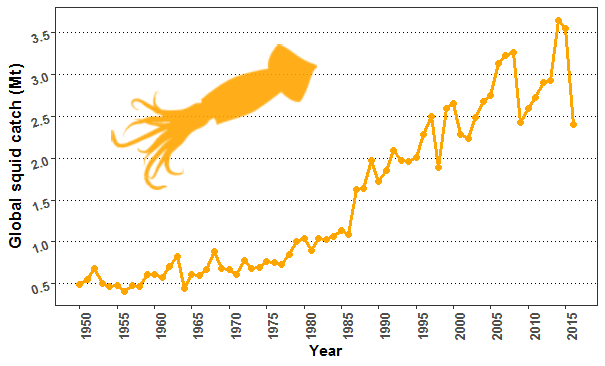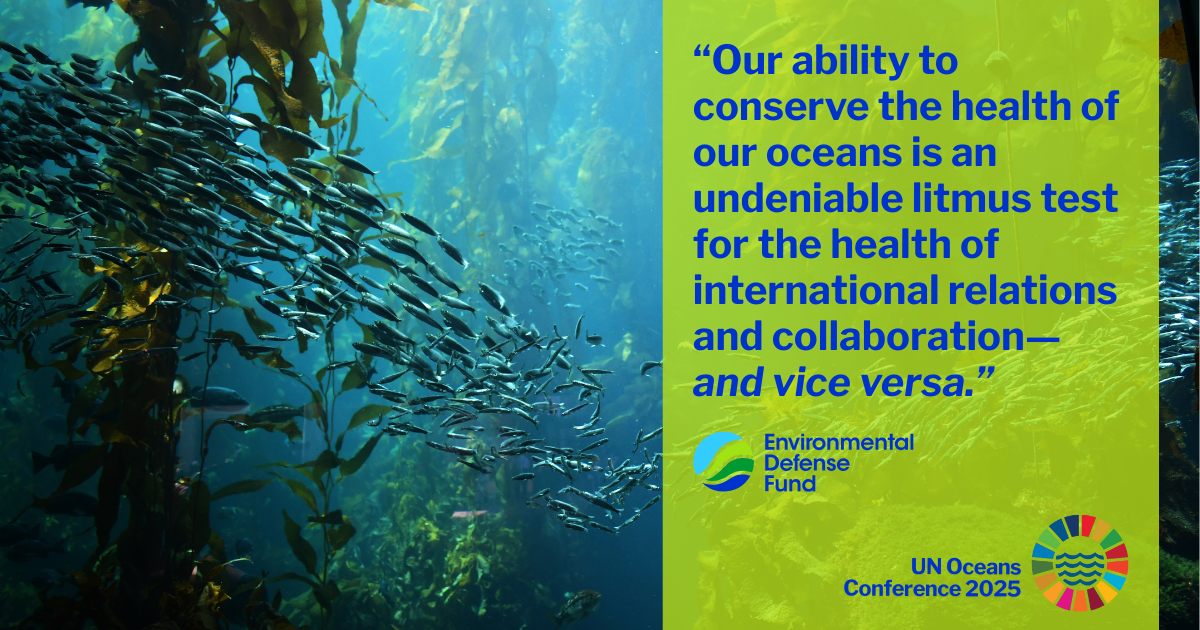Will calamari play an important role in future climate-resilient fisheries?

Besides being the star in calamari appetizers, squid play the crucial roles of both predator and prey in marine ecosystems. Globally, squid can be found in nearly every ocean habitat from seagrass beds, to coral reefs, to the open ocean. Squid fisheries provide livelihoods and high-quality protein to communities, large and small all over the world. And as it turns out, studying squid can teach us valuable lessons about how to build climate-resilient fisheries. A new paper in Fisheries Research will help fishery managers predict where jumbo squid (Dosidicus gigas) populations might migrate under different scenarios of climate change, and help researchers understand why some species are more resilient than others.
While overall squid catches (all species combined) have increased in recent years, it is unclear what the future will hold in the face of climate change and other pressures. Healthy ecosystems depend on resilience from all links of the food chain. This research, which I contributed to along with a number of leading marine research organizations including Shanghai Ocean University, The University of Washington and The University of Maine, suggests that squid may play a more important role in improving climate resilience in the world’s fisheries than previously thought.
We found clear evidence of different migration routes and diets between El Niño (warm) and normal years. Consistent with previous studies, our results suggest potential habitat area for jumbo squid will decrease with ocean warming. However, during El Niño years, jumbo squid were able to successfully switch their food source to organisms lower in the food chain. While the results suggest the migration and feeding habits of jumbo squid are substantially influenced by oceanic dynamics, encouragingly, the foraging flexibility of jumbo squid suggests they have a high capacity to adapt to environmental volatility.
With the reality that much of the world’s ocean is getting warmer and extreme events are becoming more commonplace, species that are highly mobile, fast growing and reproducing, and flexible with what they eat will be poised for more success than their less adaptive counterparts. And while most fisheries in the world have either stabilized or declined in recent decades, squid catches have more than doubled since the mid-1980’s. So, incorporating squid as part of a diverse fishing portfolio may increase economic and ecological resilience in the face of climate change.
The analysis combined oceanographic data and biological samples to track how both the location and diet of jumbo squid off the west coast of South America changes with abrupt climatic events. We sampled beaks from squid caught in the Chinese commercial fishery and analyzed their chemical composition. Beaks grow through continued deposit of new material onto the edges of beak’s lateral wall, so as squid grow, so do their beaks. Though the material is hard, it contains chemical traces of the water chemistry and diet from when it was deposited. With this information, and knowledge of where and under what conditions the squid was caught, scientists can look backwards to learn about where the squid has been, and where it exists in the food web.
We are often confronted with depressing news about the oceans in the face of climate change. What’s important to keep in mind is that while many species are fighting an uphill battle, others possess adaptive characteristics that might poise them for success, like squid. Lead author on the paper, Dr. Guanyu Hu, explains, “Understanding how changing climate regimes affect biology is crucial as we move forward in the face of ocean change. However, for this to happen, we need more investigation into their biology, and how it changes based on space, time and environment.” While some studies have begun to broadly examine the effects of changing environments in the oceans, there has been little attention given to squid and their capacity to adapt to changing oceans despite their global economic and ecological importance.
This research helps fill in some of these gaps. It builds on a large body of oceanographic and fisheries knowledge to better understand how jumbo squid, distributed from California to southern Chile, respond to rapid changes in ocean conditions. Insights into how changes in temperature and food availability affect migration patterns and population trends are crucial for improving scientists’ ability to understand how squid can adapt to their environment and how we can create a future of climate-resilient fisheries.
If squid are able to change their foraging habits in response to changing ocean conditions, it’s possible other species are as well. While we will still need to hold global emissions to no more than 2 degrees Celsius of warming, and make management changes anticipating shifts in distribution and abundance, these findings are encouraging because they mean some fisheries are inherently more resilient to climate change—making our task at hand a bit easier.












